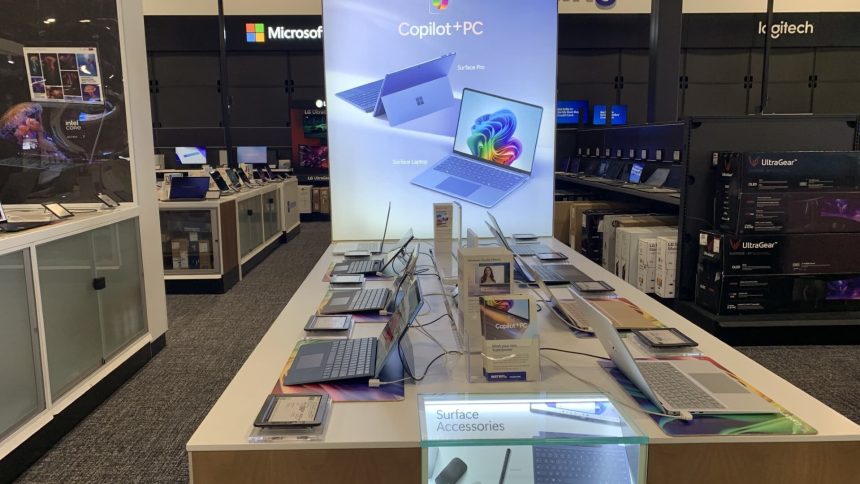It always turns out the same way: No matter what people might say, the beginning of an interest rate cycle always causes a change in command in the stock market. You must always change your mind, hold your nose, and buy what look to be some of the weakest names — the stocks that do best when rates go down, especially the housing-related stocks. In our case, that means Best Buy , Stanley Black & Decker and Home Depot . These Club stocks — beaten down, disliked, without sponsorship — go from being ugly ducklings to beautiful must-own swans. Best Buy is one of the most reviled stocks we have ever purchased. We bought our initial lot prematurely, on March 27, but as always we started small. That way the worst that happens is it shoots up higher and we kick it out for a small gain. In this case, the small buy was heavily justified as the stock fell like a rock thrown out of the Empire State Building. Surprised it didn’t hit somebody. Suffice it to say, we bought it all the way down and risked some serious derision, which we got. Some of it had to do with the old joke being that Best Buy was nothing but an Amazon showroom. I got two “thanks for putting me into the next Circuit City.” Hoo-hah! But I wasn’t just thinking of the rate cycle. The electronics retailer has several things going for it that couldn’t be beaten. First, we could be on the verge of the biggest PC refresh story since the Intel 386 migrated to the 486. Here’s why: The average PC refresh cycle is about three to four years, which is right now; the artificial intelligence PC is here and it’s very exciting; and Best Buy has 40% of the allocation of AI PCs, so they will be the go-to place for buy them. These aren’t your typical PCs and you will need instruction. Best Buy has the instructors. In addition, Best Buy has some pretty darned good management. CEO Corie Barry is a no-nonsense heavyweight who mastered the supply chain for Best Buy during the pandemic. She didn’t get any credit for it, but she did. When Barry came on “Mad Money,” she told a great story about the mounting momentum for the AI PC and how Best Buy had the biggest selection. She also dropped that 40% figure. I actually believed that the stock would go higher on the interview, but many of the pros don’t watch “Mad Money” or aren’t members of the Club. Or both. I have been out to see HP Inc , the maker of many of the AI PCs and I can tell you that you will want one even if you own a new PC. They just aren’t the same as the old ones in a very exciting way. I almost wanted to recommend HP, but it has that very tough printer division that is still bleeding and always will. The competition is just too fierce. Finally, there’s what happens when you have a good rate cycle. Right now the market is frozen. People don’t want to lose their low-rate mortgages. But people are beginning to anticipate mortgages that start with a 5 handle and that may be enough to get things going. If it is, people will begin to upgrade their homes, both buyers and the sellers. They have ample home equity loan capacity and they have held off buying appliances. As the JPMorgan recent upgrade on Best Buy said, most investors don’t realize how awful this period has been for Best Buy. Now it is over. And the appliances, big tickers with big margins, will start to sell. It doesn’t hurt, of course that Best Buy has a substantial dividend — 3.68%, down from 4% and 5% when we were buying it. Nor does it hurt that there are so few buys in the stock and there is a roughly 7% short position. We have seen retailers levitate, including Williams-Sonoma , Dick’s Sporting Goods and Abercrombie & Fitch . It’s Best Buy’s turn. The housing play Stanley Black & Decker is also one of the more reviled stocks out there. We waited until it was more than cut in half before we started buying it in June of 2023, but that was still too early. It traded down to the high $70s and we were there all the way. Why? Because when someone wants to sell a used house they need to fix things up. They can either hire a contractor, who more than likely will use DeWalt tools. Or they can do it themselves, which also means Stanley and Black & Decker tools. Why was this one so hated? There had been many mistakes by management during Covid and the Trump tariffs. Much of their stuff is made in China, and they handled the importing in a clumsy way. And they had some very squishy quarters. Like Best Buy, you had to hold your nose and just keep buying because of your conviction in the coming rate cycle, not the company. Fortunately, the company actually disposed of a business and fixed its weak balance sheet and made sure it could pay for its fairly hefty dividend. What’s amazing is that there are almost no buys on this one. Just an agglomeration of holds and sells on Wall Street. That makes it so you have to stay long, even after a spectacular gain. I never believe in sitting back and relaxing, but this one could have some mileage ahead as it used to be twice as high so analysts can always upgrade and say they missed nothing. I can’t say you ain’t seen nothing yet. I can say it is a pretty obvious play now that the rate cycle has begun. Home Depot is the easiest case of the three, the home improvement retailer has been biding its time until the buyers started going nuts. That’s because of how visible Home Depot is as a time-honored coiled spring now that estimates are low and it’s the place to buy tools, appliances, paint and whatever else is needed to fix up a house before you sell it. We picked Home Depot over Lowe’s because that you want to have the chain with the bigger percentage of professionals. I envision homebuilders flocking to Home Depot and its new division SRS, which Home Depot recently purchased and competes with Builders First Source for the professional for all sorts of home-related building materials. Lowe’s just isn’t complete enough. I don’t like to conflate money with deadly storms, but Hurricane Helene has wiped out a lot of houses, and homeowners have insurance. That means some very big orders are coming Home Depot’s way. This one just keeps rolling. Consumer staples struggle, industrials shine It’s difficult to understate how bad a positive rate cycle change can be for the recession-resistant stocks, especially the consumer packaged goods names. You know we have cut back our Procter & Gamble position drastically because you shouldn’t own any of these right now. Plus, P & G blew the quarter because of some bogus Chinese investigation into their business. We got bailed out by uninformed buyers who wanted to bet against a soft landing. And we could be further bailed out by the ridiculous Chinese stimulus plans. Oh, you say this time is different? It is always different and yet it always ends up in the same place: no dice. Without a direct infusion of capital into the hands of buyers, like a down payment for a home, these stocks are all window dressing. Nevertheless, the serial liars that run that country will make up some GDP numbers and suck more people in. As always, if you want to trade there — investing is impossible — buy Alibaba . It’s actually worth something. Procter & Gamble will most likely stall here. Why not sell it all? Because it’s just a placeholder and it doesn’t bother me. It can’t hurt us. Now how about our industrials? They are fulfilling their roles. We have watched Eaton and Dover go higher and that was without the rate cycle, just with the data center. Linde is outperforming because it has so many different non-cyclical components — medical, carbon capture, helium. It has had virtually no volume growth though. That will come with the lower rates so, strangely, it is early as a cyclical even if it is late as a secular grower. The one I am most angry about is Honeywell, which is just simply rangebound because new management, if you can still call them new, has been overpromising and underdelivering. It has plenty of cash and borrowing capacity but it just fritters away waiting for who knows what. I loved the way when the stock blew up after the last quarter they immediately floated that they might sell their Quantum Computing division. It’s hubris to even call it a division, though. How about an initiative? I figure that even as professional investors know that there’s really no there there, the retail investor will go nuts for a quantum computing chit in the big game. How cynical can these guys be? Why hold it? Because someone might come to their senses there and realize that having a stock range bound is not a victory. Tech troubles Tech seems like the biggest quandary. Why do you need a tech when you can go with an industrial or a housing-related company? Simple. Because the textbook never said don’t own techs. Only the consumer packaged goods stocks and the drugs are off the table right now. Our techs have their own stories. Broadcom is one quarter away from the next big step function of earnings. If you don’t believe me, go back and listen to my interview with CEO Hock Tan in San Francisco. We had an earnings breakout in VMWare, but we didn’t get the blowout in PCs or cellphones and somehow, there were actually people let down by the gigantic AI numbers, which are only going to get better. Remember, we want to avoid companies right now that have slight beats, not ones that can have big beats — even if they are in tech. Broadcom will have the kind of beat that people could go crazy for. I know we sold some Meta , but that was to avoid being bacon. When you have a company that can have a hit like these Ray-Bans with artificial intelligence and a camera and it doesn’t even matter, well that’s saying something in itself. I am troubled by Alphabet , so we let some go. But not as troubled after seeing its Waymo business in action. And I know that as exciting as Elon Musk will be whenever he blathers on about self-driving cars, Waymo’s vehicles are already racking up the miles to make it so they are the real deal. Salesforce is about to go from an enterprise software dud to a company like ServiceNow that actually has a legitimate product levered to AI in Agentforce. This unique product takes advantage of generative AI and can simulate an individual without the weariness and suppressed anger of the real deal. Trust me when I say that instead of screaming, “Will you please put a human on the line?” you will be begging for the agent. Client companies are more excited about this product than anything CEO Marc Benioff has ever unveiled. Apple ? I don’t want to get on my soapbox too often about this, but these services that purport to tell you how the new iPhones are selling? They have been systemic failures and have gotten more people to sell this stock than just about any source of information, including downgrades. They are shameless and they are never called out on their fallacies. There is no research jail, or they would be in it. T-Mobile CEO Mike Sievert said sales on the iPhone 16 are very strong. But because we had this news on “Mad Money” and shared it with the Club, it just didn’t matter. Who are these people to ignore this news? The same people who don’t know an apple from an apricot. Is the multiple too high? Not if the predictable earnings stream keeps growing. And I think it will. Which brings me to the last and most difficult story: Nvidia . It is true that the chipmaker missed the whisper. But what matters isn’t that it missed, it’s why it missed. It wasn’t demand. It was supply. The yield, how many chips actually were manufactured to spec versus how many that had to be thrown away was way too low. Blackwell is extraordinarily hard to make. Nvidia still doesn’t seem to be shipping in volume. To which I say: Good. This stock will not be able to roar until we get all of the gunners, the day traders, the memesters out of it. I figure another month of this torture — or a breakdown below $200 — will do the trick. If you can’t handle that kind of decline, by all means exit and try to get back in lower. I can’t. It’s too hard. So I am owning it, not trading it. As always. (See here for a full list of the stocks in Jim Cramer’s Charitable Trust.) As a subscriber to the CNBC Investing Club with Jim Cramer, you will receive a trade alert before Jim makes a trade. Jim waits 45 minutes after sending a trade alert before buying or selling a stock in his charitable trust’s portfolio. If Jim has talked about a stock on CNBC TV, he waits 72 hours after issuing the trade alert before executing the trade. THE ABOVE INVESTING CLUB INFORMATION IS SUBJECT TO OUR TERMS AND CONDITIONS AND PRIVACY POLICY , TOGETHER WITH OUR DISCLAIMER . NO FIDUCIARY OBLIGATION OR DUTY EXISTS, OR IS CREATED, BY VIRTUE OF YOUR RECEIPT OF ANY INFORMATION PROVIDED IN CONNECTION WITH THE INVESTING CLUB. NO SPECIFIC OUTCOME OR PROFIT IS GUARANTEED.
It always turns out the same way: No matter what people might say, the beginning of an interest rate cycle always causes a change in command in the stock market. You must always change your mind, hold your nose, and buy what look to be some of the weakest names — the stocks that do best when rates go down, especially the housing-related stocks.
Read the full article here
News Room




